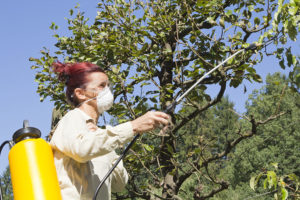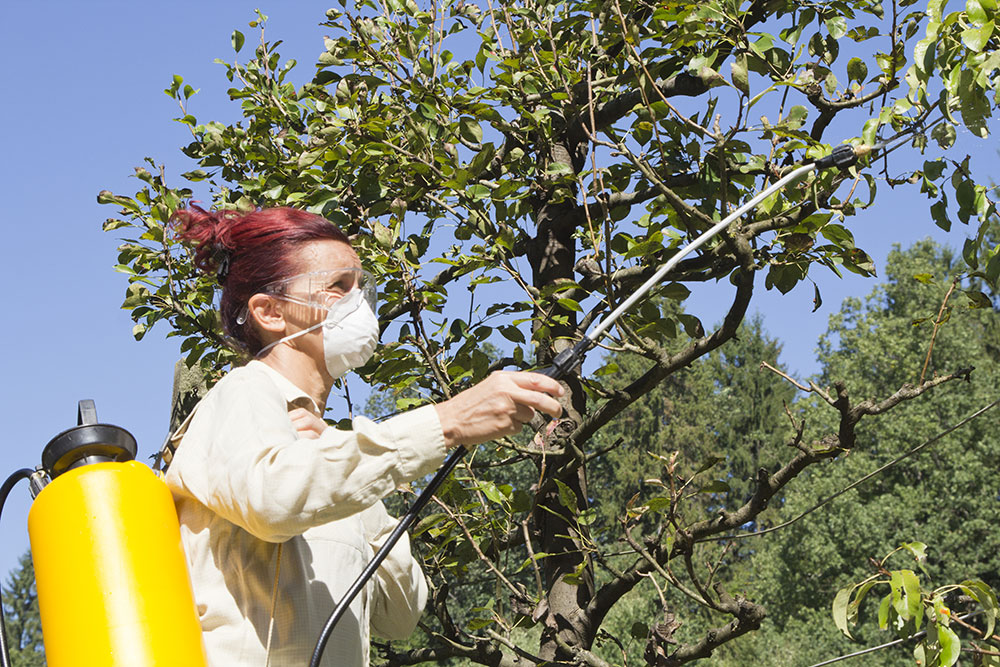Disclaimer: The information on our website is provided for general information purposes only. We make no representations or warranties of any kind, express or implied, about the completeness, accuracy, reliability, suitability or availability with respect to the website or the information contained on our website for any purpose. Any reliance on such information is therefore strictly at your own risk and we are not liable for any damages or losses arising out of or resulting from your reliance on any information contained on our website.
A pesticide handler has to work with numerous chemicals by mixing and applying them to various surfaces indoors and outdoors. They use these chemicals in multiple ways through sprays, liquid applications, dust, and pellets. They may work to protect homes, businesses, and outdoor shrubbery or crops. Watch a video to learn what a pesticide handler does.
How to Become a Pesticide Handler
Pesticide handlers have a high school diploma and usually receive extensive on-the-job training. They also work with chemicals that can be hazardous if breathed in, come in contact with skin, or swallow. Therefore, pesticide handlers are specifically trained to safely handle and apply pesticides, herbicides, fungicides, or insecticides. People and animals’ safety in the environment in which they use the pesticide is essential.
Therefore, a pesticide handler must complete training per the U.S. Environmental Protection Agency (EPA) safety standards (link opens in a new tab). Handlers must also abide by any state, territorial, or tribal law when applying pesticides. Most states have a Pesticide Safety Education Program that you may need to attend. According to the EPA, federal law also requires certification if a person uses restricted use pesticides (or RUPs). This certification would train individuals on how to apply RUPs properly and effectively. More information about certifications is located on the EPA’s Pesticide Worker Safety page.
Pesticide handlers also should have good customer service skills since they will be working with all kinds of clients and have accurate record-keeping skills to track data on hours they work, chemicals used, and payments collected. Therefore, being organized and detailed oriented will be essential to be successful when working as a pesticide handler.
Job Description of a Pesticide Handler

A pesticide handler primary task is to get rid of unwanted pests. Sometimes, these individuals are also known as pest control technicians or applicators, pending what state you reside in. However, no matter what you are called, they complete these tasks by applying pesticides, herbicides, and fungicides to various surfaces indoors and outdoors. They determine what will eliminate the pest problems and mix chemicals to get the appropriate strength for a given job. They apply to ensure all areas are treated. This does require physical labor as they often must bend, reach, and lift the dispensing equipment to ensure they get to the hard-to-reach areas.
Pesticide handlers must also know about various plant diseases so they can treat the issue appropriately. When treating an area, they must be informed of weather conditions that may impact the application’s effectiveness. Due to the nature of the chemicals involved, these specialists must also be up-to-date with the EPA’s safety regulation to ensure they keep the public and themselves safe.
Pesticide handler primarily work full time and are always traveling from one location to another, whether it be a home or a business. Weekends, nights, and day times hours are the most common work schedules. Sometimes they can be called for emergencies if a client calls for immediate removal of pests. They work in all kinds of weather, both indoors and outdoors. Besides, this can be very physical while inspecting or treating sites, often kneeling, bending, and crawling into tight spaces. Pest control handlers also wear protective gear when working with pesticides to protect themselves from breathing in chemicals that may be toxic.
Pesticide Handler Career Video Transcript
Pesticide workers apply chemicals to handle weeds, insects, and diseases. Work is generally outdoors in all weather conditions, and involves frequent bending, kneeling, lifting. Year-round employment may be available. Workers who apply pesticides or fertilizers typically need a high school diploma or equivalent and must obtain a license.
Article Citations
National Center for O*NET Development. 37-3012.00. O*NET OnLine.
United States Environmental Protection Agency. Pesticide Worker Safety. Safety Training for Pesticide Workers and Handlers and How to Get Certified as a Pesticide Applicator.
The career video is in the public domain from the U. S. Department of Labor, Employment and Training Administration.

